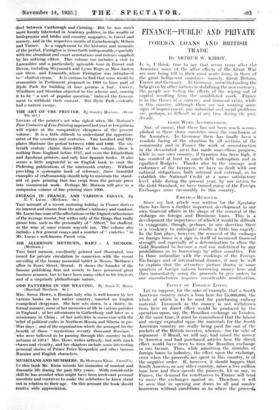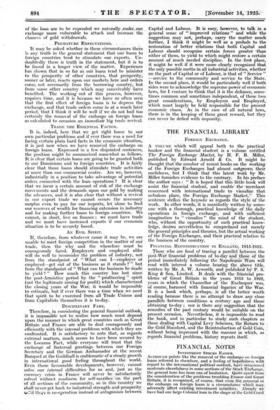FINANCE--PUBLIC AND PRIVATE
FOREIGN LOANS -AND BRITISH TRADE
Br ARTHUR W. KIDDY.
Ix is, I think, true to -say that seven years after the Armistice some of the after effects of the Great War are now being felt in their most acute form, in three of the great belligerent countries—namely, Great Britain, France and Germany. In German, notwithstanding the help given by other nations in stabilizing the new currency, the people are feeling the effects of the wiping out of capital resulting from the annihilated mark. France is in the throes of a currency and financial crisis, while in this country, although there- are not wanting some Signs Of improvement, our industrial and social problems are, perhaps, as difficult as at any time during the past decade.
GOOD IVOR): ACCOMPLISHED.
Not, of course, that there has not been much ReCOill• plished in these three countries since the conclusion of the Armistice. -In Germany there has finally been a resolute facing of the situation by all sections of the community and in France the work of reconstruction in the devastated areas has made marvellous progress, While in Our own country, if taxation has been high, it has resulted at least in much debt redemption and in equalized Budgets. Thanks also to the courage and endurance of the taxpayer, we have so dealt with our national obligations, both internal and external, as to establish the National Credit at a more satisfactory level, while during the present year, by our return to the Gold Standard, we have turned many of the Foreign Exchanges more favourably to this country.
EMBARGO REMOVED.
Since my last article was written for the Spectator there has been a further important development in our own financial affairs in the shape of the removal of the embargo on foreign and Dominion .loans. This is a development the importance of which it would be difficult to exaggerate, though, perhaps, in one direction there is a tendency to anticipate results a little too eagerly. In the first place, however, the removal of the embargo on foreign loans is a sign in itself of increased financial strength and especially of a determination to allow the Gold Standard to become a real one unfettered by any prohibitions as to borrowings by other countries. For to those unfamiliar with the workings of the Foreign Exchanges and of international finance, it may be well to explain that the attractive . picture drawn in- some quarters of foreign nations borrowing money here and then immediately using the proceeds to give orders to our manufacturers requires considerable modification.
EFFECT OF FOREIGN LOANS.
Let us suppose, for the sake of example, that a South American country raises a loan here for L5,000,000, the whole of which is to be used for purchasing railway material. Inasmuch as the money is not withdrawn from here no direct effect would be produced by the operation upon, say, the Brazilian exchange on London. At the same time, it must be remembered that the labour and energy expended upon the materials for the South American country are really being paid for out of the pockets of the British investor, whereas—for the sake of argument—if Brazil, we will say, had raised the money. in America and had purchased articles here the direct effect would have been to turn the Brazilian exchange in our favour. Thus, while admitting the stimulus of foreign loans to industry, the effect upon the exchange,: even when the proceeds arc spent in this country, is of the negative order. If, however, it should happen that South America, or any other country, -raises a five million loan here and .then spends the proceeds, let us say, in France, the demand for remittances to France will tend to move the exchanges against us. Therefore, it will be seen that in opening our doors to all and sundry borreivers .Withent. cOnditiOns-as to -Where the :pioceixts of the, loan are to be expended we naturally make our exchange more vulnerable to attack and increase the chances of gold withdrawals.
_ PREMATURE EXPECTATIONS. _ _ It may be asked whether in these circumstances-there is any truth in the general statement that our loans to foreign countries tend to stimulate our, exports. Un- doubtedly there is truth in the statement, but it is to be found in a longer view., of the matter. Experience has shown that in so far as our loans tend to Minister to the prosperity of other' Countries, that' prOsperity; sooner or later, reacts upon our Markets here and orders come, not necessarily from the borrowing country, but from some Other country which may conceivably have benefited. The working out of this process, however, requires time, and it is because we have so often seen that the first effect of foreign loans is to depress the exchange, and that trade orders come in at a much later period, that I think it will be well if we do not bait too certainly the removal of' the embargo on foreign loans as calculated to occasion an immediate big trade revival; „ • .TRADE THE ESSENTIAL FACTOR. - It is, indeed, here that we get right home to our own particular problems and if ever there was a need for facing certain plain hard facts in the economic, situation, it is just now when we have removed the embargo on foreign loans. Expressed in a few disjointed sentences; the position might be summarized somewhat as -follOws. It is clear that certain loans are going to be granted both to our Dominions and to foreign countries. It is fairly clear that those loans should stimulate trade activities at more than one commercial centre. Are we, however, industrially in a position to take advantage of potential orders connected with the loan operations ? It is clear that we incur a certain amount of risk of the exchange Movements and .the demands upon our gold by making the advances, and it is also clear that without a revival in our export trade we cannot - secure the necessary surplus even to pay for our imports, let -alone to feed our reserves of wealth for financing extension in industry and for making further loans to foreign countries. We cannot, in short, live on finance ; we must have trade and we must have increased exports if our economic situation is to be securely based.
AN EVIL SPIRIT.
If, therefore, from whatever cause it may be,- are unable to' Meet foreign competition in the matte of our trade, then the why and the wherefore must be courageously faced. Employers and employed alike will do well to reconsider the problem of industry, not from the standpoint of "What can Ieinployer employed—get out of the business as it stands ? ' but from the standpoint of " What can the business be Made to yield ? " How much this country has lost since the post-Armistice period -by the " profiteering " spirit (not the legitimate aimingfor profit) which characterized the closing years of the War, it would be impossible to estimate; but if ever there was a time when we. need that spirit to be exorcised from all Trade :Unions and from Capitalists 'themselves it is to-day. _ - DISCIPLINARY FARE.
Therefore, in considering the general financial outlook, it is impossible hot- to realize how much must _depend upon the manner in which great countries such as Great' Britain: and France 'are 'able to deal courageously and efficiently with the internal problems with which they are confronted, It is satisfactory to note that, as regards external matters, Much seems to have been secured by the. Locarno Pact, while everyone will trust that the exchange Of fraternal greetings between our Foreign Secretary and the German Ambassador at the recent Banquet at the Guildhall is emblematic of a steady growth in -international good - feeling throughout the world. Even those favourable developments, however, cannot solve our internal difficulties for us and, just as the currency :crisis in :France will never bc satisfactorily solved without readiness for self-sacrifice fUn the part of all sections of the community, go in this bountry we shall-never get back to industrial strength and, prosperity ulna thT -is co-operation instead of antagonism between' • Capital and Labour. It is easy, however, to talk in a geneial sense of improved relations" and while the suggestion may not, perhaps, carry the matter much further, I think it might be well ag a prelude to the restoration of better relations that both Capital and Labour should recognize certain forces greater -than either of them, to yield to which might restore a certain amount. of much needed discipline. In the. first place, it might be well if it were more clearly recognized that the only possible motto in all industrial activities, whether on the part of Capital or of Labour, is that of " Service " -service, to the . community and service to the State. In the second place, it would be particularly well if both sides were to acknowledge the supreme power of economic laws, for I venture to think that it is the defiance, some- times common and sometimes independent, of these two great considerations, by Employers and Employed, which must largely be held responsible for the present economic chaos. As in the case of all natural laws, there is-in the keeping of them great reward, but they can never be defied with impunity.



























































 Previous page
Previous page